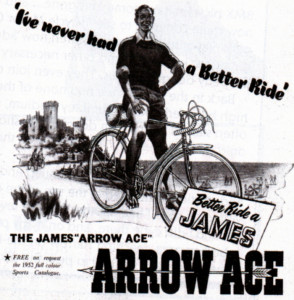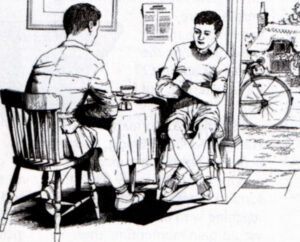 In 1949 1 acquired a Norman Invader bicycle. It took all my savings to buy it.
In 1949 1 acquired a Norman Invader bicycle. It took all my savings to buy it.
I first saw it in Topley’s bicycle shop. It had Reynolds 531 tubing throughout and GB alloy brakes, three-speed Derailleur gears, pedals with toe clips and adjustable handlebars to let you cycle with your nose on the front wheel. It had narrow lightweight wheels and mudguards, and a narrow racing saddle (more comfortable than it looked). 1 think the price was about £27 (or easy terms), but I had to have it.
Two friends, Norman Frange and Geoff Bragg, also acquired lightweight machines and a cycling fraternity was formed. Geoff went for a machine with a fixed wheel. He would gain momentum, then stand up on one of the pedals rising and falling like a horse on a roundabout.
Norman bought a Hercules Kestrel; it had the chrome, but my dull aluminium was lighter. Demonstrating the lightness of your bike by lifting it with one finger was a West Wickham youth virility test.
Being a serious cyclist meant convening every evening at the Blake Recreation Ground and boasting about your achievements. To establish real status you had to cycle to Brighton and back -a round trip of about 100 miles.
After the Brighton route we ventured as far as Littlehampton -about the limit for a day trip. We spoke knowingly about the hills on the route.
Secretly we had to get off and push on Handcross Hill on the Brighton Road and
Bury Hill on the way to Littlehampton.
We bicycle-dipped our trousers high on the calf to reveal a fleshy gap between socks and trousers. Don’t ask me why. It was the fashion and seemed important at the time. One of our associate members tucked his trousers into his socks and wore his school cap – but then Ron Cardigan wore his school cap everywhere. Even, I suspect, in bed.
Geoff Bragg had a disconcerting habit of disassembling his bike whenever and wherever he happened to be. It was a marvellous conversation piece and impressed the girls no end, as he upended his bike and adjusted the chain. We all had other cycling affectations, including alloy feeding bottles mounted on our handlebars -like the riders in the Tour de France we saw on British Movietone News.
Our cycling excursions all blend into one. Geoff was temperamental and volatile and liked to be the pacemaker, disappearing out of sight before collapsing on the hills complaining of leg cramps or problems with wheel wobble or an urgent need to adjust his calliper brakes.
Norman was phlegmatic, heavily in a romantic cowboy phase. He could cycle for miles tonelessly crooning, ‘East is east and west is west and the wrong one I have chose… drone, drone, drone, de da da da… in buttons and bows’.
As an encore he would sing another cowboy song called Chost Riders in the Sky. I know it began: ‘An old cowpoke went riding out one dark and stormy night’ and concluded, ‘Yippee I ay, yippee I oh, ghost riders in the sky’.
Norman sang it all in an imitation American accent that sounded like a Cornishman with adenoids.
Striking out
 There came a time when day trips were not enough.
There came a time when day trips were not enough.
We devised a grand tour, a weekend marathon, striking south west to Littlehampton on Friday night, along the coast to Brighton and on to Hastings, returning by Sunday evening.
We learned a lot from that trip: the value of contingency planning and meteorological reports, for example.
We arrived at Littlehampton in the small hours. Sleeping out in the sand dunes was not what we anticipated. It was very near to freezing.
I’d thought the sand would be warm and we’d stretch out under the stars like something in the Desert Song but it turned out to be more like Scott of the Antarctic. Geoff, with uncharacteristic foresight, had brought a small blanket. It wasn’t a lot of help. We spent the small hours running up and down the sandy beach trying to keep warm.
The rain started after we ate a cheese roll breakfast in a cafe. It kept on raining and we kept on cycling. By the afternoon we were wet, saddle-sore and somewhere near Hastings.
We had envisaged sleeping out on the cliffs at Hastings, then home on Sunday afternoon, but it would have been drier in Beckenham swimming baths. Norman’s cycling cape (an Army war surplus groundsheet) had sprung a leak. My plastic mac was funnelling a steady stream of rainwater into my lap. A change of plan was called for.
We set our faces towards London and kept on pedalling. We were stopped in Tunbridge Wells by a bored policeman, who at 2am wanted to point out that Geoff’s rear light wasn’t working. We dismounted until he was out of sight, then resumed cycling. I think it stopped raining about midnight.
We arrived home about five on Sunday morning, as Bowyer’s milk carts hit the
streets and we dispersed to our beds.
In the evening we reconvened at the Rec. Our achievements grew in grandeur. In fact Mary Whitley was positively adoring as she heard of my heroic struggle against the elements – a reaction that I then tried to turn to my advantage down Lover’s Lane.
We never repeated our grand tour. Secretly, none of us fancied pain and suffering. It did, at least, prepare us for National Service. Geoff went into the Army, Norman to the Navy, and I into the Air Force and sadly, we never met up again.
I often wonder what happened to my cycling companions? Are they working out on their exercise bikes somewhere? Or have they joined the ghost riders in the sky?
Robert Edom








